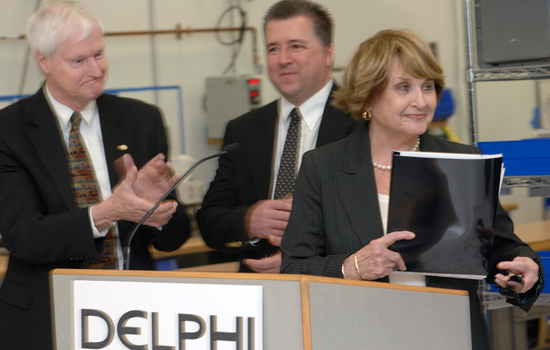RIT forges new partnership with Delphi
$2.75 million will help military vehicles use alternative energy
A. Sue Weisler | photographer
Congresswoman Louise Slaughter announces a $2.75 million grant that will help Delphi Automotive and RIT conduct fuel-cell research. Pictured with Slaughter are Steve Shaffer, the company’s chief engineer for fuel cells, center, and RIT President Bill Destler.
Through the efforts of U.S. Congresswoman Louise Slaughter and New York’s U.S. Senate delegation, RIT’s Center for Integrated Manufacturing Studies has been awarded a $2.75 million grant for a joint research project with Delphi Automotive that will assist Rochester in becoming a hub of the alternative-energy industry. “This funding will support important work at RIT to enhance our nation’s security,” says Slaughter. “It will also assist in creating jobs and spurring economic development in our community, while at the same time helping ensure our servicemen and women have the best tools to do their jobs in the field.” CIMS and Delphi will utilize the funds to assist the U.S. military in incorporating alternative-energy technologies into vehicle operations.
The research will support the military’s need to implement fuel-cell technology into their vehicle fleets, reducing costs, energy use and improving operation. The project will also advance the development of local production of fuel-cell technologies enhancing the potential for significant industry investment and new jobs to the Rochester region. The effort will look to improve the performance of solid oxide fuel cells and identify opportunities for implementation within energy systems. The work builds on Delphi’s fuel-cell development efforts and will also utilize CIMS’ state-of-the-art sensors monitoring technology to evaluate the quality of fuel-cell powered systems.
“This funding is welcome news for these two local institutions that have helped to build the region’s reputation as a leader in research and development,” says Sen. Hillary Clinton.
“This is an important investment in the Delphi/CIMS partnership and key to the success of their innovative fuel-cell project. Not only are we investing in local jobs and building on the area’s economic growth, but we are also ensuring our men and women in uniform will have access to the leading technology of the day.” Adds Sen. Charles Schumer: “This funding keeps the Rochester area on the cutting edge of fuel-cell research. Supporting the Delphi-RIT partnership is important not only for our military, but also for its potential to grow jobs locally.”
“This joint research effort between RIT and Delphi will further enhance this region’s reputation and asset base as a center for alternative energy development and its applications,” notes RIT President Bill Destler. “It is a tremendous example of government-university-industry collaboration that will leverage the expertise at CIMS and our partners at Delphi, and further strengthen our foundation for the new Golisano Institute for Sustainability at RIT. We appreciate the efforts of Congresswoman Louise Slaughter and Sens. Schumer and Clinton to successfully include this funding in the defense appropriations bill.”
“Situational awareness, future weapons and next-generation protection systems will require more electric power generated quietly and at higher efficiency,” adds Russ Bosch, Delphi’s director of fuel-cell development. “The fuel cell is a preferable technology for meeting these needs because the cell’s higher efficiency decreases the amount of fuel that needs to be transported and the fuel cell’s quiet operation improves ‘stealth’ capabilities.”
Rochester area economic development leaders echoed RIT and Delphi in lauding the significance of this new initiative for regional growth. “Rochester has a host of research, academic and industrial advantages that make it an excellent location for development of alternative energy businesses,” notes Sandy Parker, chief executive officer of the Rochester Business Alliance. “The efforts of Congresswoman Slaughter and our U.S. Senate representatives in aiding this fuel-cell project will only further the development of a strong and vibrant fuel-cell production center in our region.”
“The Rochester region, thanks to the strength of organizations like RIT and Delphi and the work of our federal representatives, is a leader in fuel cells and other alternative-energy technologies, and we are well poised to generate a significant number of new jobs and economic growth in this sector,” adds Dennis Mullen, president and CEO of Greater Rochester Enterprise. “Developments like this one help validate our vision, and move us closer to achieving our regional growth targets.”









